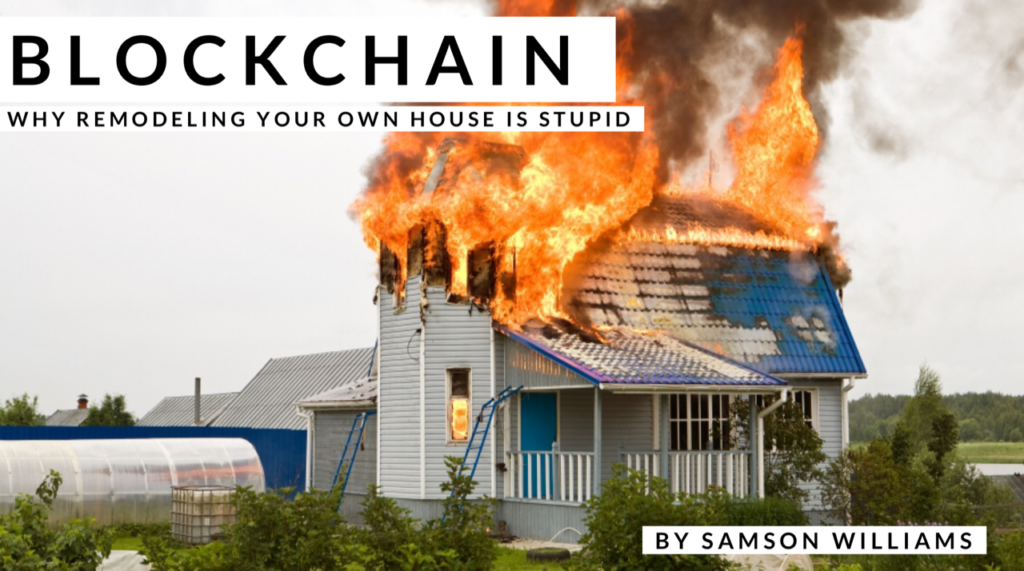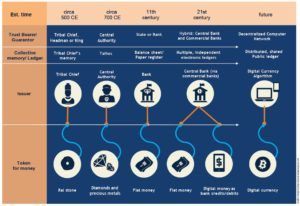I love hearing the enthusiasm and joy in the voices of first time home buyers who are going to save money, bond and remodel their house together. Brand new doctors, seasoned lawyers, accountants, project managers, the boldest of GenX and Millennials who grew up swinging VR joystick in lieu of hammers. But they’ve watched Property Brothers and Love It or List and have the best database of YouTube videos for home remodeling in their entire subdivision or building. They even park in the “Pro” section at Home Depot and have their very own monogrammed Leatherman construction gloves.
You can remodel your own home. Even “just” your kitchen or “just” your bathroom. You can read and have all the resources at your disposal. But don’t. Don’t even fucking think about it. Remember how you tried to cook Thanksgiving dinner last year and ended up burning up your kitchen, which is why you need to replace it? Those were simple enough directions too, right?
But what does this have to do with blockchain and more importantly your business?
Glad you asked. Well, your business is like your house. Blockchain is like a remodel. You can do it yourself. You’re after all a pro at your business. But your business isn’t blockchain. Your business is shipping, consulting, farming, logistics, banking, money exchange, insurance, lending, maybe even selling pizzas. Your business is a business. Your business isn’t a way of doing business or a business tool like blockchain. Your business is a way of generating you income to provide for your family, workers, community, financial security and future. It ain’t a way to decentralize any of those, unless you want to find out what a “decentralized” retirement looks like. (Hint, think working poor at 75 years old. #GigEconomy).
So! Before you decided to attempt to blockchain your business, ask yourself, “Could I remodel my house?” 99.99% of the time the answer is “Fucking, hell, no!” You should no more attempt to “blockchain” your business than you should remodel your house. So what do you do?
Hire a professional
Can’t afford one? Then you’re not ready to remodel your house or “blockchain” your business.
By the way, do you even know what the fuck “blockchaining your business” even is? I’m like an expert in this industry and I don’t recommend 99% of businesses “blockchain” any part of their business. Cause did you know you can “blockchain” parts of your business operations, functions and processes and not the entire business? I’ll tell you a secret, blockchain is just a tool you use to do your business. It ain’t a business itself, a panacea for customer acquisitions or guarantee of increased sales or revenue. It’s like a hammer that’s shiny and brand new, but in your hands it’s more likely to tear giant holes in your business’ model, customer base and revenue streams.
So, like you would a plumber, carpenter or WiFi guy, before you go to “blockchain your business” hire a professional. Cause the funny part is once (if) you blockchain your business, then you’ve got to run your business. Remember, blockchain isn’t your business. Your business is. Don’t allow the hype of DIY tech nerds get you wild with excitement leaving you swinging a proverbial sledge hammer through your internal operations and revenue streams.
Hire a professional. And much like building a house, don’t start by hiring a painter to lay the foundation. Hire a General Contractor to guide you through the process. And whatever you do, do not let the plumber and electricians (coders and programmers) charge you by the hour. As then, it’ll take three times as long, cost 10 times as much and your odds of being electrocuted when you drop a deuce are high.
Who is a “Blockchain General Contractor”? Axes and Eggs of course.
Blockchain plumbers, carpenters, electricians, painters, engineers and designers: Chainhaus — they’re your one stop shop. But you can always go to the Home Depot of Blockchain Deloitte Ireland.
Fly by night, Tim the Tool man, unpermitted, lien inclined, blockchain enthusiast.… On the advice of our legal counsel (www.cogentlaw.co) I won’t name those decentralized con artist. But they probably showed up to give you an estimate driving a Lamborghini and offered you custom views of the moon. So you know who they are.
Conclusion
Stick to your business. It’ll ultimately make you more money.
Oh, and if you need a real Construction General Contractor, visit www.mattbeth.com
My name is Samson. I’m an Adjunct Professor at Univ of New Hampshire School of Law, human and an anthropologist at Axes and Eggs, a Washington, DC based Think Tank and digital advisor. If you like what you read, share it! If you disagree, share what you know or how you feel in the comment section below. Feel free to hit me up on Twitter or Instagram @HustleFundBaby or follow me onLinkedIn. Finally, I would say thoughts are my own but I probably stole them from a woman.

